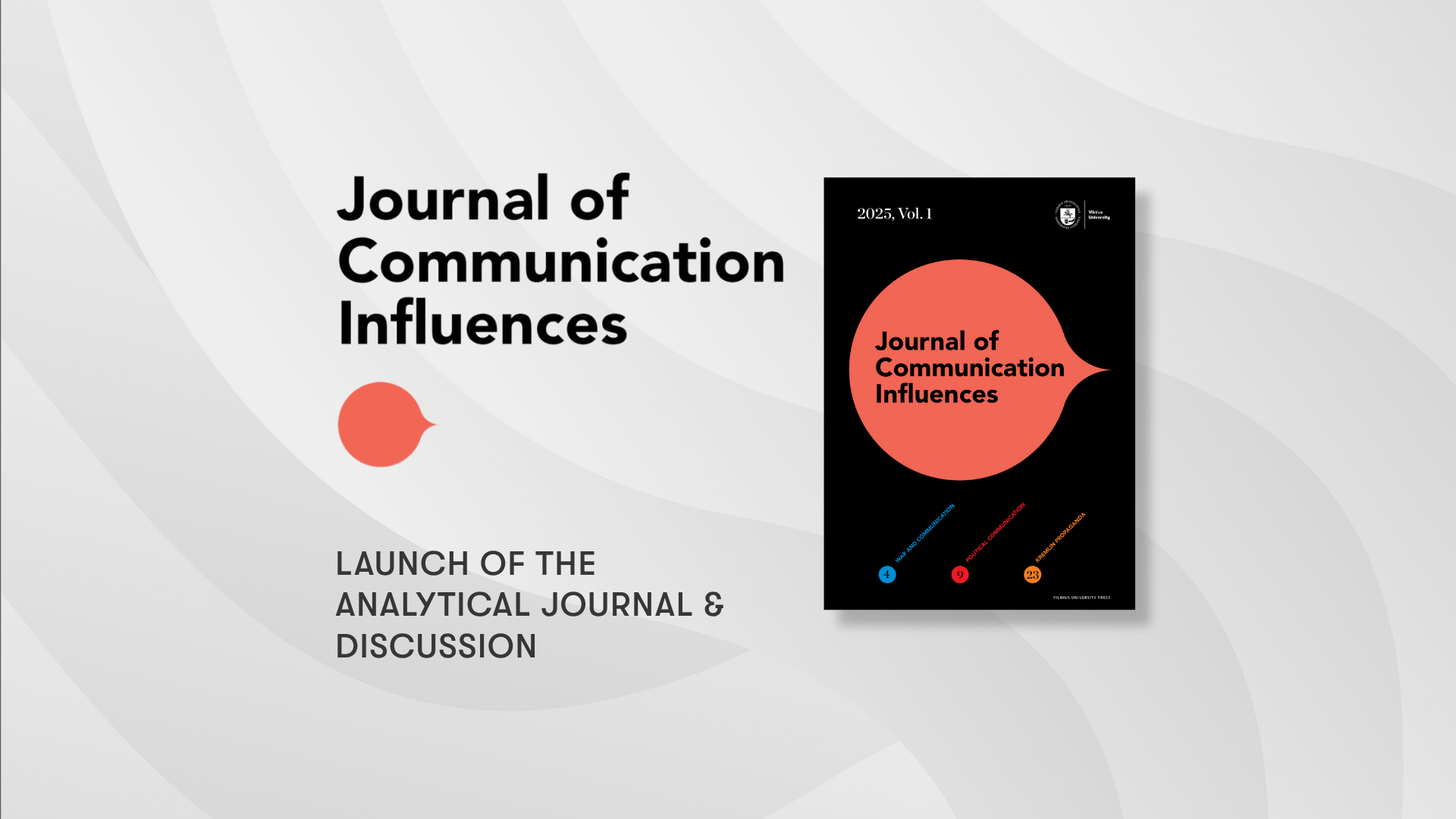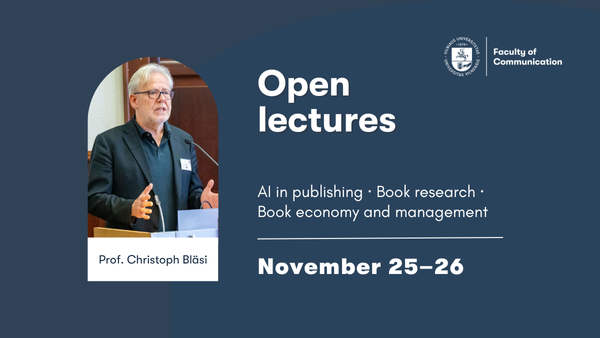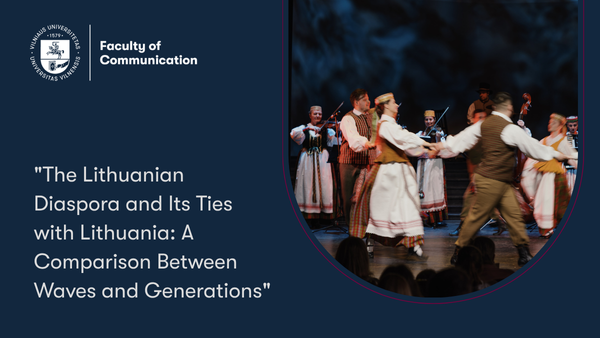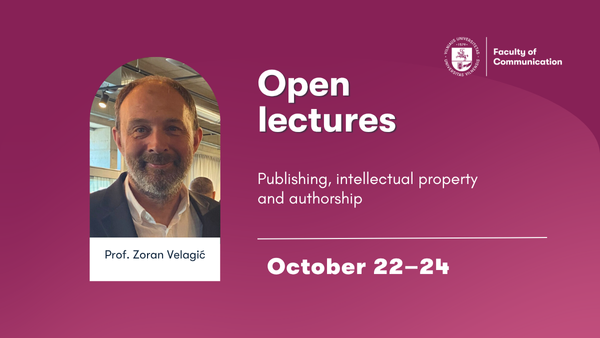Institute of Library and Information Sciences (2013)Saulėtekis ave. 9, Ist building, 215, 216 rooms
Saulėtekis ave. 9, JR 212 room
Saulėtekis ave. 9, IIIrd building, 416 room
Tel. +370 5 236 6109
Contact person
spec. Laima Statulevičienė
Departments
About
The origins of the scientific research and study of library and information sciences at Vilnius University date back to the 16th century. They are related to practical (pragmatic) activities, when the Jesuits were organising the library at the college that was founded in 1570 (it was during this year that the first library catalogue was compiled).
Another important impetus for mastering the theoretical subjects of library science was the mass of innovations in the classification of science and knowledge – Antonio Possevino’s Bibliotheca selecta, which was printed in 1593, became a reference point for several hundred years in developing libraries and systemizing scientific and other information throughout the entire Grand Duchy of Lithuania.
In the 19th century, when library science was crystallising into an independent branch of study, a seminar organised at Vilnius University by Godfrydas Ernestas Grodekas played an important role, as this is where future librarians such as Kazimieras Kontrimas, Liudvikas Sobolevskis and Stanislovas Žukovskis studied bibliography and other subjects. In the works of Joachim Lelewel and Aleksander Bohatkiewicz of that time, library science was considered to be as a constituent part of bibliography (the study of books).
On the other hand, in Dzieje bibliotek (“The Development of Libraries”, 1828), Joachim Lelewel perceived library science as the continuous and complex process of professional activity and the creation of libraries, going back in its origins to Eastern and Classical civilisations.
Prior to World War II, bibliography subjects were taught at Vytautas Magnus University in Kaunas (1922, 1925), courses for librarians were organised in 1936, and librarian training was continued in 1940–1943 at the bibliography department that operated in Vilnius and Kaunas. Juozas Rimantas, a graduate of the department, tried to bring together researchers from libraries and other memory institutions for scientific work around the publication Bibliotheca Lituana.
In 1952, the Library Science Department was established within the Vilnius University History–Philology Faculty, based on the Library Science Division that had been functioning since 1949. When the Faculty of Communication was established in 1991, the Library Science Department remained, but was reorganised: some of its lecturers became administrative and academic faculty at the Departments of Book Science, Information Systems, and Communication and Information Theory.
In 2003, the Institute of Library and Information Sciences (ILIS) was established on the basis of the aforementioned department.
The department and institute were headed by: Prof. Dr. Levas Vladimirovas (1952–1957, 1958–1964), Prof. Dr. habil. Vladas Žukas (1964–1967), Prof. Dr. habil. Klemensas Sinkevičius (1957–1958, 1967–1977, 1978–1981), Prof. Dr. habil. Viktoras Urbonas (1977–1978), Assoc. Prof. Dr. Genovaitė Raguotienė (1982–1992), Prof. Dr. (HP) Audronė Glosienė (1992–2006), Assoc. Prof. Dr. Jurgita Rudžionienė (2006–2008), and Prof. Dr. Rimvydas Laužikas (2008–2013). Prof. Dr. (HP) Arvydas Pacevičius has been head of the institute since 16 September 2013.
The mission of the Institute of Library and Information Sciences is to prepare highly qualified specialists in the fields of information services, culture information and communication, carry out scientific research, and nurture scientists.
The objectives of the Institute of Library and Information Sciences are:
- To organise culture information, communication and other studies in training highly qualified information service specialists.
- To conduct scientific research in the activities of heritage and memory institutions, the development of museums, libraries, archive history and heritage collections, and the creation and interaction of digitisation and information infrastructure.
- To engage in the dissemination of scientific research at national and international conferences and by publishing scientific articles in periodicals as well as in both recurrent and one–off scientific publications.
- To participate in national and international academic projects and working groups; to initiate new academic projects and implement and/or direct them.
- To maintain and strengthen relations with Lithuanian and foreign social partners in improving the quality of studies, carrying out scientific research and projects, and ensuring dissemination of information about them.
Science and Research
The research carried out by the Institute of Library and Information Sciences covers branches of communication and information such as library science, information, bibliography, book science, and documentation, as well as the field of Lithuanian studies and interdisciplinary humanitarian and social research and studies.
In the 20th century, this research developed as a constituent part of the study of books (bibliography, book science), and was closely related to the studies of cultural history, bibliography, and Lithuanian press and manuscript heritage. In the late–20th and early–21st centuries, the social, informational and holistic paradigms of library science research, in which digital culture and the library as a constituent part of virtual reality were emphasised, became manifest.
Priority in ILIS research is given to topics such as digital libraries, informational interaction of memory institutions, and the origins of collections, their development and digitisation.
The main research theme of the Institute of Library and Information Sciences for the period 2015–2019 is Development and Change of Culture and Science Communication in Information Infrastructures. The aim of research theme is to investigate the development and change of culture and science communication, the organization of information infrastructures, using historical, theoretical, methodological, didactic, technological applicability and other aspects of investigation.
The fields of research of the Institute of Library and Information Sciences are:
- Digitisation of heritage and using computer-based methods and tools for heritage and information research (Z. Manžuch, R. Varnienė-Janssen, A. Pečeliūnaitė, A. Pacevičius, V. Stancelis);
- Evaluation of public institutions, management of information resource, management of digitalisation and digital literacy (J. Rudžionienė, Z. Manžuch, V. Grigas, S. Juzėnienė, S. Jokūbauskienė, L. Juchnevič, A. Pacevičius);
- Censorship, readership and development of archives, libraries, and museums (A. Pacevičius, E. Sėdaitytė);
- Science communication (A. Pacevičius, A. Valinčiūtė, M. Stonkienė);
- Local lore studies (L. Juchnevič, A. Pacevičius, V. Stancelis).
Recurrent and periodical academic publications
The results of research conducted by scholars/experts of the Institute of Library and Information Sciences are published in Knygotyra (“Book Science”) and Informacijos mokslai (“Information Sciences”), two scientific journals published by the FC, as well as in other national and international recurrent and periodical publications.
A volume of Bibliotheca Lituana: atminties institucijų rinkiniai (“Bibliotheca Lituana: Collections of Memory Institutions”) was published in 2012; it is likely that this will become a recurrent collection of ILIS scientific works. It is planned that this publication, which was conceived back in interwar Lithuania and revived by the ILIS, will feature articles and source publications on problems related to library and information science theory, methodology and history, the development and interaction of memory institutions, the cultural heritage of the Grand Duchy and modern–day Lithuania as well as the digitisation thereof, and so on.
Valuable historical sources were published in the first collection, including “The 1598 registry of books at the church of St Stanislaus Cathedral near Vilnius castle” (prepared by Iwona Pietrzkiewicz), “The old catalogues of memory institutions in the funds of the Wroblewski Library of the Lithuanian Academy of Sciences: the case of the 1575 inventory of the St Ilya monastery in Slutsk” (prepared by Rima Cicėnienė), and “The 1651 inventory of the library of Aleksander Radziwiłł (Aleksandras Radvila) in Nesvizh” (prepared by Rafał Witkowski).
This volume of Bibliotheca Lituana also includes articles devoted to library and information science theory and research methodology of old library collections, such as “The methodology of publication of catalogues and inventories of the libraries of the Grand Duchy of Lithuania” (by Lilija Kowkiel, Arvydas Pacevičius, Iwona Pietrzkiewicz) and “The paradigms of library science in a network society” (by Ineta Krauls).
The 3rd volume of the serial publication Bibliotheca Lituana: sugrąžinta praeitis ("Bibliotheca Lituana III: Past Returned") was published in 2014.
Research results also are published in scientific monographs, studies, collections of scientific articles, publications of sources and publications covering social and cultural issues.
Scientific events
Research findings are presented by scholars of the Institute of Library and Information Sciences at national and international academic conferences and seminars.
Each year on the 2nd December, the institute organises the ‘Readings of Vaclovas Biržiška’ conference. In 2015, the institute’s scholars held ‘Readings of Vaclovas Biržiška 2015: The Library like a Participating Institution (2 December 2015, Birštonas).
International academic conferences organised by the institute include:
- Ego-documents: Historiographical Traditions – Perspectives of Researches, 15–16 May 2014, Toruń (in conjunction with Nicolaus Copernicus University in Toruń).
- Past Returned: the Phenomenon of Prof. Lavas Vladimirovas and Dissemination of his Scientific Ideas, to mark the 100th anniversary of Prof. Vladimirovas’ birth, 15–16 November 2012, Vilnius (in conjunction with Vilnius University Library).
- Lithuanian Ego-documental Heritage in Europe: Research, Interpretation and Dissemination, 29–30 September 2011, Vilnius (in conjunction with Nicolaus Copernicus University in Toruń).
- Aggregation and Management of Audiovisual Content in the Digital Space, 5–7 October 2009, Vilnius (in conjunction with the Baltic Audiovisual Archival Council and Lithuanian Central State Archives).
- Evaluation Library Services: Does it Lead to Innovation and Effectiveness? 16–17 November 2007, Vilnius.
- Communication of Memory in Archives, Libraries and Museums: the Interaction of Science, Politics and Practice, 4–5 October 2007, Vilnius.
National academic conferences organised by the institute include:
- Readings of Vaclovas Biržiška 2015: The Library like a Participating Institution [V. Biržiškos skaitymai 2015. Biblioteka kaip dalyvaujamoji institucija], 2 December 2015, Birštonas.
- Silva Rerum Like Egodocumental Heritage [Privačioji raštija ir egodokumentinis paveldas: nuo silva rerum iki šiuolaikinių socialinių tinklų], 7 October 2015, Panevėžys (in conjunction with Panevėžys County Gabrielė Petkevičaitė-Bitė Public Library).
- Readings of Vaclovas Biržiška 2014 [V. Biržiškos skaitymai 2014. Asmenybės raiška: nuo XVIII a. bibliotekininkų iki XXI a. tinklažmogių], 2 December 2014, Vilnius.
- Descriptions of the Travels like a Ego-documental Heritage [Kelionių aprašymai kaip egodokumentinis paveldas: nuo Panevėžio iki Paryžiaus“], 15 October 2014, Panevėžys (in conjunction with Panevėžys County Gabrielė Petkevičaitė-Bitė Public Library).
Publications
- GRIGAS, Vincas; BALČIŪNAITĖ, Lina. Expression of Learning Community in Academic Library: Vilnius University Library Case. [Mokymosi bendrijos raiška akademinėje bibliotekoje: Vilniaus universiteto bibliotekos atvejis]. Vilniaus universiteto bibliotekos metraštis 2015, 2015, p. 103–126. ISSN 1822-3699.
- JOKŪBAUSKIENĖ, Saulė. Entrepreneur: the Second Generation of World Wide Web: Development of Organizational Tools in the Perspective on Lifelong Learning [Antrepreneris: antrosios kartos saitynas: organizacijos įrankių kūrimas mokymosi visą gyvenimą aspektu]. Informacijos mokslai, 2015, No. 73, p. 7–15. ISSN1392-0561.
- MANŽUCH, Zinaida. Strategic Management of Cultural Heritage Digitization [Strateginis kultūros paveldo skaitmeninimo valdymas]. Vilnius: Academic Publishing, 2015, p. 304 ISBN: 9789955336723.
- PACEVIČIUS, Arvydas; NAVICKIENĖ, Aušra. Repressive Censorship, Underground Publishing, and the Distribution of Lithuanian Books in the Northwest Region of the Russian Empire (1795–1904). In Jan. C. Behrends, Thomas Lindenberger (eds.) Underground publishing and the public sphere: transnational perspectives. Wien: Lit Verlag, 2014, p. 75–95, (Series: Wiener Studien zur Zeitgeschichte. Bd. 6.).
- PEČELIŪNAITĖ, Angelė. The Users of Lithuanian Academic Libraries Electronic Catalogue [Lietuvos akademinių bibliotekų elektroninių katalogų naudotojai]. Knygotyra, 2014, Vol. 63, p. 189–215.
- JUZĖNIENĖ, Simona. Framing of Academic Libraries’ Roles in the Strategic Documents of Universities: a Map of Factors and Agents. Advances in Library Administration and Organization. Monographic series. Bingley: Emerald Group Publishing Ltd, 2014, Vol. 32, 107–146.
- PACEVIČIUS, Arvydas. Bad readers of a Good Library over 100 Years Ago in Vilnius: Vilnius Public Library Diary in the Context of Public Library Movement in Lithuania. Good book, good library, good reading. Studies in the history of the book, libraries and reading from the network HIBOLIRE and its friends / eds. Aušra Navickienė, Ilkka Mäkinen, Magnus Torstensson, Martin Dyrbye and Tiiu Reimo. – Tampere: Tampere University Press and Authors, 2013, p. 286–315.
- PACEVIČIUS, Arvydas. Ego-documents and Private Lithuanian Space in the 16th–20th c. [Egodokumentai ir privati Lietuvos erdvė XVI–XX amžiuje], Vilnius, 2013.
- PACEVIČIUS, Arvydas. 1779–1780 Diary of a Butler’s Travels to Italy and Germany [Butlerio kelionės į Italiją ir Vokietiją 1779–1780 m. dienoraštis. Compiled by Arvydas Pacevičius, prepared by Waldemar Chorążyczewski, Arvydas Pacevičius, Agnieszka Rosa. Vilnius, 2013.
- PACEVIČIUS, Arvydas. Pastoral Letter to the Priests of the Samogitian Diocese [Ganytojiškas laiškas Žemaičių vyskupijos dvasininkams] by Juozapas Mykolas Karpis. Prepared by Arvydas Pacevičius and Vacys Vaivada. Vilnius, 2013.
- RUDŽIONIENĖ, Jurgita; PROKOPČIK, Marija. Evaluation of the Activities of Academic Libraries as a Management Tool for Qualitative Changes: Information Resources Evaluation Attempt at Vilnius University Library [Akademinių bibliotekų veiklos vertinimas kaip kokybinių pokyčių valdymo priemonė: informacijos išteklių vertinimo bandymas Vilniaus universiteto bibliotekoje]. Tiltai, 2013, No. 1, p. 87–103.
- Bibliotheca Lituana II. Bibliotheca Lituana II. Collections of Memory Institutions [Atminties institucijų rinkiniai]. Compiled by Arvydas Pacevičius, 2012.
- PACEVIČIUS, Arvydas. Juozapas Jurgis Hilzenas and his Diary: a Few Strokes for the Biography of a Mason [Juozapas Jurgis Hilzenas ir jo Dienoraštis: keli štrichai masono biografijai] / compiled by Vytautas Jogėla. Laisvoji mūrininkija pasaulyje ir Lietuvoje: idėjos, istorija, asmenybės [Freemasonry in the World and Lithuania: Ideas, History, Figures]. Vilnius: Lithuanian National Museum, 2012, p. 175–196.
- PEČELIŪNAITĖ, Angelė. The Unified Communications Paradigm in Cloud Computing: Analysis of the Theoretical and Practical Aspects of the Microsoft Lync 2010 Communications Platform [Vieningos komunikacijos paradigma „debesų“ technologijose: „Microsoft Lync 2010“ komunikacijos platformos analizė teoriniu ir praktiniu aspektais]. Informacijos mokslai, 2012, Vol. 60. p. 36–52.
- KRAULS, Ineta. Paradigms of Library Science in a Network Society [Bibliotekininkystės mokslo paradigmos tinklaveikos visuomenėje]. Atminties institucijų rinkiniai. Bibliotheca Lituana, 2012, Vol. 2, p. 19–32.
- PROKOPČIK, Marija. Preparation and Adaptation of Multilingual Thesauruses: the Case of the LiDA Lithuanian Data Archives [Daugiakalbių tezaurų rengimas ir adaptavimas: Lietuvos duomenų archyvo LiDA atvejis]. Informacijos mokslai, Vilnius University, 2011, Vol. 57, p. 55–73. ISSN 1392–0561.
- PEČELIŪNAITĖ, Angelė. Cloud Computing: Work, Cooperation and Communication. Does the Cloud Meet the Needs of Students and Scientists? [Debesų kompiuterija: darbas, bendradarbiavimas ir komunikacija. Ar debesis tenkina studentų ir mokslininkų poreikius?] Informacijos mokslai, 2011, Vol. 55, p. 117–130.
- GRIGAS, Vincas. Possibilities for Developing the Librarian Educator: the Lithuanian Case [Bibliotekininko edukatoriaus ugdymo galimybės: Lietuvos atvejis]. Informacijos mokslai, 2011, Vol. 58, p. 74–93.
- JUCHNEVIČ, Laura. Staff Supervision in the Management of Library Reputation: Presentation of the Results of Lithuanian District Public Library Research [Personalo valdymas bibliotekos reputacijos vadyboje: Lietuvos apskričių viešųjų bibliotekų tyrimo rezultatų pristatymas]. Informacijos mokslai, 2011, Vol. 55, p. 19–31.
- VARNIENĖ–JASSEN, Regina. Virtual Electronic Heritage System: Digital Content and Electronic Services for Lithuania and Europe. Bibliotheca Baltica Newsletter, Vol. 21, 2011.
- Forgotten Patronage: A Book of Gifts to the Vilnius University Library, 1792–1832 [Pamirštoji mecenatystė: dovanų Vilniaus universiteto bibliotekai knyga, 1792–1832]. Compiled and prepared by Arvydas Pacevičius. Vilnius, 2010.
- Alma Mater Vilnensis: Features of the History of Vilnius University: A Collective Monography [Alma Mater Vilnensis: Vilniaus universiteto istorijos bruožai : kolektyvinė monografija]. By: Alfredas Bumblauskas, Sigitas Jegelevičius, Benediktas Juodka, Algirdas Jakubčionis, Mečislovas Jučas, Liudas Jovaiša, Antanas Kulakauskas, Saulius Kaubrys, Romanas Plečkaitis, Arvydas Pacevičius, Eligijus Raila, Bronius Riauba, Vygintas Bronius Pšibilskis, and Eugenija Ulčinaitė. Vilnius: Vilnius University Publishing House, 2009, p. 1032
- Patrimony of the Radziwiłłs (Radvilas) in Dubingiai: A Monography [Radvilų tėvonija Dubingiuose: monografija]. Co–written by Rimvydas Laužikas, Albinas Kuncevičius, Rimantas Jankauskas, Daina Stankevičiūtė, and Indrė Rutkauskaitė. Vilnius, 2009.
- MANŽUCH, Zinaida. Archives, Libraries and Museums as Communicators of Memory in the European Union Projects. Information research, 2009, Vol 14, issue 2.
- MANŽUCH, Zinaida. Monitoring Digitization: Lessons from Previous Experiences. Journal of documentation, 2009, Vol. 65, issue 5, p. 768–796.
- Memory Communication in Archives, Libraries and Museums [Atminties komunikacija archyvuose, bibliotekose ir muziejuose]. Compiled by Zinaida Manžuch and Arvydas Pacevičius. Vilnius, 2008.
- PACEVIČIUS, Arvydas. Dissemination of the Ideas of Gabriel Naudé: In Search of a Model for the Modern Library [Gabrielio Naudé idėjų sklaida: moderniosios bibliotekos modelio beieškant]. From Gabriel Naudé. Advice on establishing a library. Vilnius: Vilnius University Publishing House, 2007, p. 171–202.
- RUDŽIONIENĖ, Jurgita; GLOSIENĖ, Audronė. Expansion of Cultural Heritage Institutions: Interaction between Politics, Technologies, Innovative Practice and Scientific Research [Kultūros paveldo institucijų plėtra: politikos, technologijų, inovatyvios praktikos ir mokslinių tyrimų sąveika]. Informacijos mokslai, 2006, Vol. 36, p. 9–25.
- GLOSIENĖ, Audronė. Social Capital and Information Technology. Journal of documentation, 2006, Vol. 62, No. 5, p. 635–640, ISSN 0022–0418.
- PROKOPČIK, Marija. Digital Inclusion – a Shift of Paradigm. Informacijos mokslai, 2006, Vol. 39, p. 19–31. ISSN 1392–0561.
- MOZŪRAITĖ, Vita; RUDŽIONIENĖ, Jurgita. Museums, Archives and Libraries in an Electronic Europe: the European Commission’s CALIMERA Project [Muziejai, archyvai ir bibliotekos elektroninėje Europoje: Europos komisijos projektas CALIMERA]. Knygotyra: Mokslo darbai, 2006, Vol. 47, p. 204–221.
- VARNIENĖ–JASSEN, Regina; KVIETKAUSKAS, Rolandas. Coordination of the Digitisation of Cultural Heritage in Europe: the Lithuanian Perspective [Kultūros paveldo skaitmeninimo koordinavimas Europoje: Lietuvos perspektyva]. Knygotyra, 2005, Vol. 45, p. 108–122.
- GLOSIENĖ, Audronė. Managing digital resources in libraries. Journal of documentation. 2005, Vol. 61, No. 6, p. 815–818, ISSN 0022–0418.
- GLOSIENĖ, Audronė. Legal Solutions in Electronic Reserves and the Electronic Delivery of International Loan. Journal of documentation, 2005, Vol. 61, No. 5, p. 680–681, ISSN 0022–0418.
- JANUŠEVIČIENĖ, Rasa. Adaptation of the Information Environment for the Visually Impaired [Informacinės aplinkos pritaikymas regos negalios žmonėms]. Informacijos mokslai, 2004, Vol. 31, p. 141–149.
- Levas Vladimirovas. About Books and Libraries: a Collection of Articles [Apie knygas ir bibliotekas: straipsnių rinkinys]. Prepared by Audronė Glosienė and Genovaitė Raguotienė. Vilnius, 2002.
University textbooks
- MANŽUCH, Zinaida. Strategic Management of Cultural Heritage Digitization [Strateginis kultūros paveldo skaitmeninimo valdymas]. Vilnius: Academic Publishing, 2015, p. 304. ISBN: 9789955336723.
- Atkočiūnienė, Zenona Ona, Glosienė, Audronė, Janiūnienė, Erika, Janonis, Osvaldas, Januševičienė, Rasa, Krivienė, Irena, Lymantaitė, Kristina, Macevičiūtė, Elena, Marčinskaitė, Dovilė, Manžuch, Zinaida, Mozūraitė, Vita, Pacevičius, Arvydas, Petrauskienė, Žibutė, Petuchovaitė, Ramunė, Prokopčik, Marija, Pupelienė, Janina, Rudžionienė, Jurgita. The Guide of Library and Information Sciences [Bibliotekininkystės ir informacijos studijų vadovas]. Vilnius: Vilnius University Publishing House, 2009, p. 700. ISBN 978-9955-33-496-5.
Training tools
- RUDŽIONIENĖ, Jurgita. Library Performance Evaluation ABC [Bibliotekos veiklos vertinimo ABC : mokomoji knyga]. Vilnius: Vilnius University Publishing House, 2010,p. 80. ISBN 978-9955-33-550-4.
- PACEVIČIUS, Arvydas. Libraries in Grand Dutchy of Lithuania: Typology, Organizational Structure, Completing Strategies: Training Book [Lietuvos Didžiosios Kunigaikštystės bibliotekos. Tipologija, organizacinė struktūra, komplektavimo strategijos]. Vilnius: Vilnius University Publishing House, 2006, p. 69. ISBN 9986-19-900-X.
- MOZŪRAITĖ, Vita. Professional Ethics ABC for Librarians [Profesinės etikos ABC bibliotekininkams : Mokomoji priemonė]. Vilnius: LNMMB, 2001, p. 79. ISBN 9986-530-92-X.
Projects
Participation in international and national projects as well as working groups is a strategic priority of the Institute of Library and Information Sciences.
ILIS specialists have participated in the following national and international projects:
- #Our Region: Education of the Identities of Vilnius and Alytus Communities in Libraries [#Mūsųkraštas: Vilniaus ir Alytaus bendruomenių tapatumo ugdymas bibliotekose]. Project implemented together with project partner Vilnius County Adomas Mickevičius Public Library. Funded under the Bill & Melinda Gates Foundation and the Ministry of Culture of the Republic of Lithuania. 2015–2016. Project Manager – Laura Juchnevič.
- Vilnius Public Library Diary, 1910–1911 [Vilniaus viešosios bibliotekos dienoraštis, 1910–1911]. Prof. Dr. A. Pacevičius. 2014. Project funded by Lithuanian Council for Culture.
- The Diary of Butlers’ Journey to Italy and Germany in 1779–1780 [Butlerio kelionės į Italiją ir Vokietiją 1779–1780 metais dienoraštis]. Prof. Dr. A. Pacevičius. 2014. Project funded by Lithuanian Council for Culture.
-
The Trainings for Library Specialists'. Project implemented together with project partner Martynas Mažvydas National Library of Lithuania. Funded under the Lithuanian Council for Culture. 2012–2015. Project Coordinator – Dr. Jurgita Rudžionienė.
- The Research Council of Lithuania’s LEGODOK (Lithuanian Ego-documental Heritage) project, 2010–2013, Prof. Dr. (HP) Arvydas Pacevičius, Prof. Habil. Dr. Waldemar Chorążyczewski, Prof. Dr. (HP) Šarūnas Liekis, Assoc. Prof. Dr. Julija Zinkevičienė.
- The Ministry of Culture of the Republic of Lithuania’s project ‘Lithuanian Museums from 1990 to 2011: Analysis of the Situation and Dissemination of Information on Research Findings’, 2012.
- The Research Council of Lithuania’s BLAIR project (Bibliotheca Lituana: Development of Collections of Memory Institutions), 2010–2011, Prof. Dr. (HP) Arvydas Pacevičius, Žygintas Būčys, Dr. Ineta Krauls, Prof. Dr. Rafał Witkowski.
- The 'HISTORIUS–P, Creation of an Infrastructure Network for Lithuanian Studies Research and Heritage: the Design Phase' project under the 'State and Nation: Heritage and Identity' programme of the Research Council of Lithuania, 2010, Assoc. Prof. Dr. Rimvydas Laužikas, Assoc. Prof. Dr. Regina Varnienė–Janssen, Dr. Daiva Vaitkevičienė, Dr. Donatas Saulevičius, Vilius Kučiukas, Ingrida Vosyliūtė.
- CARARE (Connecting Archaeology and Architecture in Europeana), a project of the European Commission 7th Framework Programme, since 2010, Assoc. Prof. Dr. Rimvydas Laužikas, VU as a project partner.
- EDLnet, a project funded by the European Union under the eContentPlus programme (European Digital Library: Thematic Network), 2007–2009, Assoc. Prof. Dr. Jurgita Rudžionienė, the FC as a participant of the partner network.
- Working group for the creation of the 'State and Nation: Heritage and Identity' national humanitarian studies programme, 2007–2009, Prof. Dr. (HP) Arvydas Pacevičius, Assoc. Prof. Dr. Rimvydas Laužikas.
- The Nordplus project, 2007 to present, lecturer Dr. Ineta Krauls.
- The BARIS project (church archives information system), 2006–2009, Prof. Dr. Arvydas Pacevičius, Assoc. Prof. Dr. Rimvydas Laužikas.
- The Civil Society Institute’s project ‘European Union Support: Efficient Use’, 2004–2008, Prof. Dr. Audronė Glosienė.
- The DigitalPreservationEurope project, 2006–2009, Prof. Dr. Audronė Glosienė, Assoc. Prof. Dr. Marija Prokopčik, Assoc. Prof. Dr. Rimvydas Laužikas, Dr. Zinaida Manžuch, PhD candidate Jūratė Kuprienė, the FC as a participant of the partner network.
- Norslis (The Nordic Research School in Information Studies), 2004–2013, Assoc. Prof. Dr. Rimvydas Laužikas.
Studies and Training
Doctoral studies
The objective of doctoral studies in communication and information is to train qualified scientists, who are professional, adaptive and able to carry out fundamental research. The doctoral students study such branches of science as library science, information, book science, bibliography, documentation, science communication etc.
Forthcoming dissertations
- Austė Valinčiūtė, Strateginis ir metodologinis rėminimo taikymas mokslo komunikacijoje, acceded 2014, academic supervisor – prof. dr. (HP) Arvydas Pacevičius.
- Edita Sėdaitytė, Sovietinė cenzūra Lietuvos atminties institucijose, acceded 2013, academic supervisor – prof. dr. (HP) Arvydas Pacevičius.
Prepared dissertations (from 2000)
- Laura Juchnevič, "Changing Library Roles in Network Society", 2016 01 27, academic supervisor – doc. dr. Rimvydas Laužikas.
- Aurelija Vernickaitė, "Information Behaviour of Members of Parliament and Its Determinanats", 2014 09 19, academic supervisor Prof. Dr. Andrius Vaišnys.
- Simona Petraitytė, “Framing of the Roles of Academic Libraries in Lithuania (Discourse Analysis)”, 13 12 2013, academic supervisor – Prof. Dr. Elena Macevičiūtė.
- Vincas Grigas, “Librarian-Educator Training Model in the Learning Society”, 13 12 2013, academic supervisor – Doc. dr. Regina Varnienė-Janssen, academic consultant – Doc. dr. Vita Mozūraitė.
- Žygintas Būčys, “Antiquities and Society: Communication of Heritage in Lithuania in the 19th Century“, 21 12 2012, academic supervisor – Doc. Dr. Nastazija Keršytė, academic consultants – Dr. Reda Griškaitė, Prof. Dr. Arvydas Pacevičius.
- Jūratė Kuprienė, “Application of Principles of Information Organisation in an Electronic Environment: Identification of Strategic Trends for Scientific Digital Libraries”, 21 12 2012, academic supervisor – Doc. Dr. Marija Prokopčik, academic consultant – Doc. Dr. Regina Varnienė-Janssen.
- Jelena Konieczna, “Reputation Formation and Management for Lithuanian Academic Libraries”, 23 12 2011, academic supervisor – Prof. Dr. Audronė Glosienė (2007–2009), Doc. Dr. Renata Matkevičienė (2009–2011).
- Ineta Sibrian, “Methodological Aspects of Research in Culture of Reading: Pedagogical Paradigm in the Lithuanian Library Science Since 1918“, 18 12 2009, academic supervisor – Prof. Dr. Arvydas Pacevičius, academic consultant – Doc. Dr. Vita Mozūraitė.
- Ugnė Rutkauskienė, “Public Libraries‘ Social and Economic Impact on Users“, 18 12 2009, academic supervisor – Prof. Dr. Audronė Glosienė (2005–2009), Prof. Dr. Elena Macevičiūtė (2009), academic consultant – Doc. Dr. Jurgita Rudžionienė.
- Žibutė Petrauskienė, „Elektroninių informacijos išteklių – licencijuojamų duomenų bazių – valdymas Lietuvos akademinėse bibliotekose“, 2008 07 02, mokslinis vadovas – doc. dr. Povilas Abarius.
- Zinaida Manžuch, “Communication of Memory in Archives, Libraries and Museums: Analysis of the EU Strategic Approach“, 06 12 2007, academic supervisors – Prof. Dr. Elena Macevičiūtė (2006–2007), Prof. Dr. Audronė Glosienė (2003–2006).
- Rimvydas Laužikas, “Archeology and Museology: an Application Model for Communication in Digital Space”, 19 06 2006, academic supervisor – Prof. Dr. Audronė Glosienė.
- Rasa Januševičienė, “Library and Information Services for the Visually Impaired People“, 04 03 2005, academic supervisor – Doc. Dr. Audronė Glosienė.
- Arida Paupurėlytė “Freedom and Control of Book Publishing in Lithuania in 1918–1940“, 11 04 2003, academic supervisor – Doc. Dr. Audronė Glosienė.
- Jurgita Rudžionienė, “Library Performance Evaluation: Management Approach“, 01 07 2002, academic supervisor – Doc. Dr. Renaldas Gudauskas
- Arvydas Pacevičius, “Monastic Libraries in Lithuania in 1795–1864“, 31 05 2001, academic supervisor – Prof. Habil. Dr. Domas Kaunas.
Academic Partners
In conducting scientific research and participating in the social and cultural dissemination of research findings, scholars/experts at the Institute of Library and Information Sciences maintain and strengthen relations with foreign partners.
Scientific institutions:
- Adam Mickiewicz University, Poland
- City University London, Great Britain
- Jagiellonian University in Krakow, Poland
- Nicolaus Copernicus University, Poland
- Pedagogical University of Cracow, Poland
- Reinwardt Academy, Netherlands
- University of Oulu, Finland
- University of Zadar, Croatia
Organisations:
- The Nordic Research School in Information Studies, NORSLIS
- The Nordic-Baltic-Russian Network on the History of Books, Libraries and Reading (HIBOLIRE)
Conference speakers:
- Abdelazis Abid (UNESCO, France)
- Lennart Bes (National Archives of the Netherlands, Netherlands)
- Dr. Roma Bončkutė (Klaipėda University, Lithuania)
- Dr. Domininkas Burba (Lithuanian University of Educational Sciences, Lithuania)
- Dr. Iryna Ciborovska-Rymarovič (Vernadsky National Library of Ukraine, Ukraine)
- Prof. Habil. Dr. Waldemar Chorążyczewski (Nicolaus Copernicus University, Poland)
- Doc. Dr. Marija Dalbello (State University of New Jersey, JAV)
- Dr. Antonella Fresa (Ministry of Cultural Heritage and Activities, Italy)
- Dr. Jolanta Gwiożdzik (University of Silesia, Poland)
- Dr. Tatsjana Hiarnovič (Belarusian State University, Belarus)
- Dr. Baiba Holma (University of Latvia, Latvia)
- Jan Hutar (National Library of the Czech Republic, Czech Republic)
- Pavel Krbec (Charles University, Czech Republic)
- Dr. Lilia Kowkiel (Pedagogical University of Cracow, Poland)
- Dr. Līga Krūmiņa (University of Latvia, Latvia)
- Doc. Dr. Olga Lobačevskaja (Belarusian State University of Culture and Arts, Belarus)
- Dr. Iwona Pietrzkiewicz (Pedagogical University of Cracow, Poland)
- Dr. Agnieszka Rosa (Nicolaus Copernicus University, Poland)
- Prof. Habil. Dr. Stanisław Roszak (Nicolaus Copernicus University, Poland)
- PhD François-Joseph Ruggiu (Paris-Sorbonne University, France)
- Dr. Miloš Řezník (Institute of European Regional History, Chemnitz University of Technology, Germany)
- Marius Snyders (European Commission, Luxembourg)
- Bohdana Stoklasová (National Library of the Czech Republic, Czech Republic)
- Dr. Aliaksandr Suša (National Library of Belarus, Belarus)
- Dr. Kim H. Veltman (Virtual Maastricht McLuhan Institute, Netherlands)
- Andris Vilks (National Library of Latvia, Latvia)
- Dr. Raphael Witkowski (Adam Mickiewicz University, Poland)
- Dr. Giuseppe Zevola (Neapolio banko fondo institutas, Italija)
- Dr. Vilma Žaltauskaitė (Lithuanian history institute, Lithuania).
Scholars of the ILIS also participate in the scientific and partnership activities of foreign countries, membership on editorial boards of scientific publications of foreign countries as well as conference organising committees and organisations, internships.
Prof. dr. Arvydas Pacevičius
- Member of Baltic Heritage Network, BaltHerNet
- Member of The Nordic–Baltic–Russian Network on the History of Books, Libraries and Reading
- Editorial board member of the journal Knygotyra (Book Science)
- Editorial board member of the journal Roczniki Biblioteczne
- Editorial board member of the journal Archiwa-Kancelarie-Zbiory
Assoc. Prof. Dr. Zinaida Manžuch
- Member of the editorial board of LIBER Quarterly, an international scientific journal
- Member of the editorial board of the Programme Committee of the International Conference ISI 2015: 14TH International Symposium of Information Science
- Member of the editorial board of the Programme Committee of the International Conference TPDL 2015: 19th International Conference on Theory and Practice of Digital Libraries
Assoc. Prof. Dr. Regina Varnienė–Janssen
- Member of Consortium of European Research Libraries (CERL), 2003–2007
- Member of the Governing Board of the ISSN International Centre, 2000–2006
- Member of the Standing Committee of the IFLA Bibliography Section, 2003–2012
- Member of the IFLA Permanent UNIMARC Committee (PUC), 1999–2003
- Member of the IFLA International Standard Bibliographic Description – ISBD Review Group, since 1998
Dr. Jurgita Rudžionienė
- Editorial board (international) member of the journal KNJIŽNICA
- Member of European Conference on Information Literacy (ECIL) Standing and Programme Committees
- Member of the Lithuanian Standards Board Technical Committee TK 47 Information and Documentation
- Board member of the Library Board of Lithuanian University of Educational Sciences
- Board member of the Programme Committee of the 6th International Symposium on Information Management in a Changing World
Dr. Vincas Grigas
- Member of European Conference on Information Literacy (ECIL) Programme Committee
- Member of international research and practice conference An Academic Library of Generation Z: Services, Spaces and Technologies Programme Committee
- Editorial board member of the serial publication Bibliotheca Lithuana III
Dr. Saulė Jokūbauskienė
- Editorial board member of the Lithuanian computer society traditional biennal multi-event Computer Days – 2015.
Social Partners
- Birstonas Public Library, Alina Jaskūnienė
- Lithuanian Library for the Blind, Dr. Rasa Januševičienė
- Lithuanian Librarian's Association, Alina Jaskūnienė
- Lithuanian Research Library Consortium, Emilija Banionytė
- Martynas Mazvydas National Library of Lithuania, Prof. dr. Renaldas Gudauskas
- The Wroblewski Library of the Lithuanian Academy of Sciences, Dr. Sigitas Narbutas, Dr. Rima Cicėnienė
- Vilnius University Library, Irena Krivienė, Assoc. Dr. Marija Prokopčik
- Vilnius County Adomas Mickevicius Public Library, Petras Zurlys







